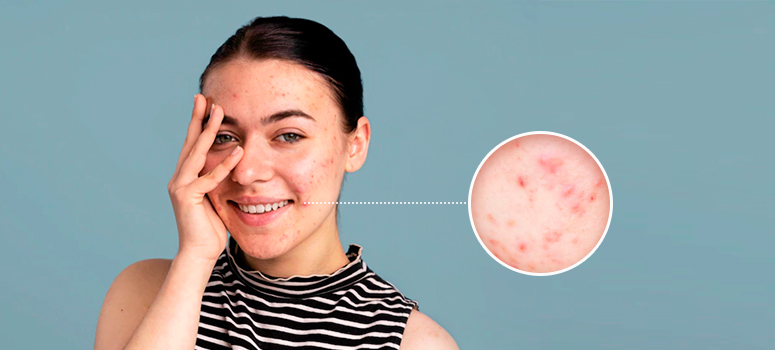Finding it difficult to differentiate between myths and facts about acne? You’ve reached the right place!
Acne or breakouts on your skin are a common problem, and chances are we have all been through a bout or two of this condition. In fact, around 80% of people have experienced acne at some point in their lives. Since the condition is so prevalent, many people often believe what others tell them about acne. It is natural to feel embarrassed to clarify a doubt about something that everyone presumes you know.
This gives rise to myths around acne, which many of us believe, without verifying facts. Knowing the facts about a disease or condition helps us seek timely professional care and get prompt treatment. Also, when we know the facts about acne, we can make the right lifestyle and habit changes to alleviate the symptoms rather than aggravate them. With acne myths and rumours, most people add fuel to the fire and worsen their acne or skin breakouts.
To help you, we’ve got some popular myths and facts to bust them!
Acne: Myths vs Facts
Myth 1: Acne means you don’t wash your face enough
Many people think acne occurs because of dirt and oil on the skin and presume not washing your face well is the primary cause.
Fact 1: Acne is caused by an interplay of several factors, including dirt, grime, pollutants, type of skin products used, hormones and diet. However, one of the primary causes of acne is sebum, an oily substance produced by glands in your skin.
Studies have shown that washing your face with a suitable cleanser twice a day is sufficient, as an excessive amount of washing can dry your skin out.
Myth 2: Scrubbing your face will clear acne
Acne is thought to arise due to dirt and grime on the skin. So, many people believe that scrubbing their face to remove any pollutants or dirt can help clear acne.
Fact 2: The truth is acne cannot be scrubbed away. In fact, using a scrub on your acne can worsen and aggravate your symptoms. Dermatologists recommend using gentle cleansers instead of scrubbing to prevent breakouts and acne flare-ups.
Myth 3: Acne occurs only during teenage years
Acne is most often found in teenagers, giving an impression that age has something to do with it.
Fact 3: Acne is triggered by hormones, so any age group is prone to it. In fact, people over the age of 50 can get acne.
Myth 4: Acne is caused by dirt
Dirt, grime, oils and pollutants can aggravate acne in people whose skin is prone to excess sebum production.
Fact 4: Studies have failed to trace dirt and poor hygiene to acne development. Excessive washing or scrubbing too hard can aggravate acne and worsen it.
Myth 5: Wearing sunscreen can aggravate your acne
Many people think applying sunscreen can aggravate skin issues like acne due to the chemicals they contain.
Fact 5: Sunscreen is a must for people of all skin types, including acne-prone skin and those with active acne. Consult a dermatologist about the right sunscreen product for your skin. If you are prone to acne, use a zinc oxide-based sunscreen.
Myth 6: Acne treatments do not work
Many people self-medicate and try different acne treatments before visiting a dermatologist or accepting acne as a part of their life. When you choose the wrong treatment for acne, it will not work.
Fact 6: The reason for acne can be different for everyone. Identifying the correct cause of your acne and appropriate medication helps effective treatment. It is always best to visit a dermatologist for your acne scar treatment.
Myth 7: Stress can aggravate acne
Have you ever noticed pimples and acne erupting on your skin and face in stressful conditions? Therefore, it is natural to presume that stress can aggravate acne or cause a flare-up.
Fact 7: When you are under stress, your body produces androgens and cortisol. These changes in hormonal levels result in acne or aggravate it. While stress can affect your skin, it does not cause a direct flare-up of acne.
To Wrap up
With advances in diagnosis and treatment, acne is a curable condition. The best way to tackle acne is to visit a dermatologist the first time you experience it. Eating a healthy diet, drinking plenty of fluids, and practising healthy lifestyle habits also play a role in keeping acne at bay. If you are struggling with acne, reach out to Skin and Hair Academy to connect with the best dermatologists in your city! They can help solve all your queries so that you no longer buy into the prevalent myths but surround yourself with facts.














